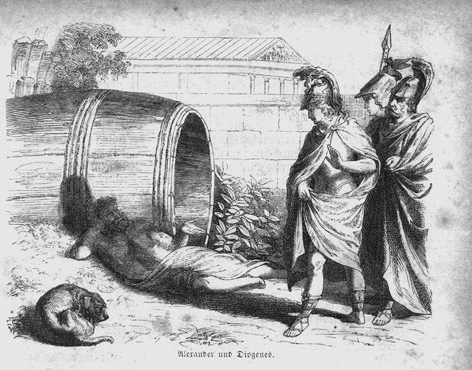Last week we moved on from Herodotus and began to read selections of poetry from the Hellenistic period in Greece from around the fall of Alexander the Great in 323 B.C. up until the eventual conquest of Greece by Rome in 146 B.C. The selections included Appollonius of Rhodes’ Argonautica, Theocritus’ Idylls, and the Epigrams of Callimachus. With the exception of the Epigrams these poems did not hold a ton of interest for me personally. The Argonautica seems to me a relatively poor effort at epic poetry when compared with the great Homer, and Theocritus is equally ponderous to my taste. However that didn’t detract from class discussions too much since we were treated with many displays of Owen’s knowledge of Greek as he recited many of these passages from heart in the original ancient Greek. On top of that he even sang many of them to great effect.
After we were finished with poetry we moved on to philosophy, which captured my interest quite a bit more. The schools covered for the latter section of the week included Plato’s Academy, Aristotle’s Lyceum, Pyrrhonian Sceptcisim, Cynicism, Stoicism, and Epicureanism. Delving into these realms of thought produced a lot more participation both in class and in our discussion forums via CC’s prowl website. I was particularly interested in Cynicism, which does not have quite the same meaning as many people would think upon hearing the word cynic in a modern context. Greek Cynicism was a precursor to Stoicism, and although it has Socratic roots it is hard to call it a true “school” because it is so unconventional and anti-theoretical. What struck me the most about Cynicism was the emphasis on askēsis, or practice, and teach a way of life as a path to virtue, rather than preaching or explaining theoretical values that must be interpreted. I find this particularly powerful because I am a big supporter of experiential learning. I have always found that the best way to learn or achieve something is by doing it, not by talking about it, and in this way Cynicism presents to me a much stronger set of ideas than other schools of philosophical thought.
Although there’s not much written by or even about the Cynics, there is one famous story regarding an interaction between Diogenes the Cynic (which in Greek translated to Dog) and Alexander the Great that really emphasizes the freedom that is emphasized in their way of life. “When he was sunning himself in the Craneum, Alexander came and stood over him and said, ‘Ask of me any boon you like.’ To which he replied, ‘Stand out of my light’” (Diogenes Laertius, Lives of Eminent Philosophers, Book 6, Chapter 28). At another point, Alexander pronounces his rank to Diogenes of Sinope by saying, “I am Alexander the Great King.” Diogenes responds with his own rank, “I am Diogenes the Cynic,” which is to say “Diogenes the Dog” (Diogenes Laertius, Lives of Eminent Philosophers, Book 6, Chapter 60).
